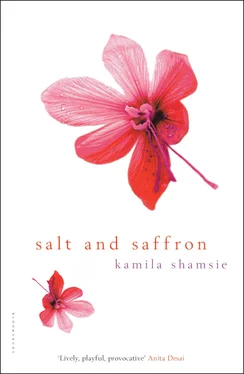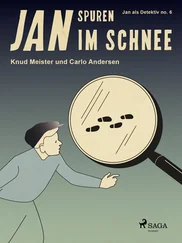‘Ye-es. But that was his habit, you know.’
Aba lowered the newspaper. ‘What?’
‘Yes, yes. He acquired the habit before he got married. You can’t expect a man to change his habits just because he gets married.’
A long pause followed this remark. Finally Aba said, ‘Why are we having this conversation?’
‘Well, this is what I’ve been trying to tell you. Masood is Jahangir’s cook!’
Next door, in Mariam Apa’s room, the bed creaked.
‘Of course,’ Ami said. ‘How stupid of me. That’s why the name of Masood’s village sounded so familiar.’
‘Don’t you see?’ Auntie Tano said. ‘Don’t you see how you can solve Mariam’s problem? Jahangir, widower. Masood, his cook. Mariam, single and starving to death.’
I try to remember how I reacted to that. I can’t.
‘Are you mad?’ Aba said, regarding Auntie Tano as though she needed spraying with pesticide. ‘Do you think I would send my cousin off to be married to a man she barely knows, in some remote village? And not just any man, but a man of those … habits. Just so that she can dine well? Over my dead body.’
‘No,’ Ami whispered. ‘Her dead body.’
I remember my reaction to that. I thought, How scripted. How absurd. I wanted to say, Auntie Tano, you’ve done your bit; you’ve told us where he is. Thank you, thank you. I’ve never said that more sincerely. But now you can go. I’m taking over.
‘So she can live there or something,’ I said. ‘Buy a house in the area.’
‘Alone?’ Auntie Tano raised her eyebrows.
Aba tossed the paper aside and waved his finger in the air to indicate a Thought. ‘No, of course not that. But maybe now that we know where Masood is perhaps … Yes. Why didn’t we consider this before? We can pay him to send a supply of food over every week. Send it by train. Or by plane even, if such things as airports exist in that godforsaken rural farmland. We could arrange that.’
Mariam Apa glided into the room, a newspaper in her hand. She lifted Ami’s hand, pointed to her wedding ring, then pointed to her own unadorned finger, and nodded.
‘No,’ I said. ‘You can’t’
For the first time ever she ignored me. She held the newspaper out to Aba, pointing to something on the page.
‘What’s this? Train schedules? Mariam, you can’t be serious.’
But she was. I knew it immediately by the sudden burning at the back of my eyes. I could not stay then. Could not stay for Auntie Tano’s confusion about how to react now that one of her ridiculous schemes was being taken seriously; could not stay for Aba’s baffled rage; could not stay for Ami’s pleas to wait a while, don’t be hasty, even if you decide to marry, not him, and if him, not now, wait, weddings have to be planned, this is not the way things are done. I could not.
I ran to my room, locked the door, and wept, though I didn’t quite know why, my fists banging against the wall. And when half an hour went by and Mariam Apa did not knock on the door, I wept some more. But when I heard Aba dragging suitcases down from the store-room shelves, I pushed myself off the bed, out of the room, into her room where she was waiting for me, arms open just wide enough to fit me in. Something of the sickness inside me dissipated then, for though I knew she would leave, I also knew he — Jahangir — would not be able to help but love her.
‘There was a boy in my class called Jahangir,’ I gulped between sobs. ‘We used to call him Jangia — Underpants.’ And then we both laughed, our heads thrown back, our shoulders shaking, our arms still around each other.
She and Aba left the next day. She had packed all her favourite clothes and books, much to the consternation of Ami, who kept saying, ‘But you’re only going to meet him now. That’s all. The wedding, if there is a wedding, won’t be for a while yet.’
But she knew Mariam Apa well enough to know there would be no planning and preparation and attention to custom and drawing up guest lists that would include everyone whose shadow had ever crossed paths with Mariam Apa and her closest relatives.
There was a strange silence in the house when they left. Ami and I retired to separate rooms to try to imagine what would await Mariam Apa at the end of that train journey. But I could not imagine the Underpants Man as anything other than a caricature, and found myself wondering over and over how she would greet Masood, and would she hug him again? And why, why, I wondered, I finally wondered, why was it that when we tried to think of ways to save Mariam Apa there was one we never mentioned?
Several times that day I paused to think of living in a house without Mariam Apa around, but I never allowed myself to linger over that thought, telling myself instead that soon I’d be gone as well, and perhaps by the time I came back for the holidays Mariam Apa would have found a way to convince Underpants to move back to Karachi and build a house in the empty plot next door to ours, with an extra-large kitchen for Masood.
Aba returned the next day, alone.
‘Well?’ Ami and I greeted him at the door.
‘Well, she’s married.’
I looked at Ami, and she looked at me, and I knew she was thinking what I was thinking, only she was thinking it with greater horror, and we both wondered, How? How can we say it? So we just said it the simplest way we knew: ‘To whom?’
I had lived all my life in that house but, I swear, I asked the question because I did not know the answer.
To set foot once more on the soil of one’s homeland. Modern airports deny us this symbolic gesture. No soil, not even tarmac. Instead we step into an elevated corridor which carries us through to passport control, luggage claim and customs clearance. Denied my Richard II moments (‘so weeping-smiling greet I thee, my earth’) I’ve learnt to crane forward, or sideways, towards a window, to await the dip of the plane’s wing, the descent from the clouds and — almost there now — the giant expanse of Karachi glittering under the darkened sky. I’ve always loved the brashness of that city, the resolve that turns on lights, night after night, not really in the hope of outstarring the sky, but just for the sake of contesting. Skyscrapered skylines, for all their self-vaunting, seem far less ambitious by comparison; the buildings shouting out, ‘I’m taller, I’m more brightly lit, hey look at me!’ vie merely with each other for attention.
As I watched the land below, an area of lights winked once, twice, and disappeared. A sigh, half exasperated, half amused, went round the cabin. ‘Bijli failure,’ someone behind me said needlessly, and we all waited to see how many lights would flicker on, signifying back-up generator power. Only a handful did, and the voice behind me said in Urdu, ‘Well, looks like it isn’t Clifton or Defence.’ The passengers around me started laughing at this mention of the élite neighbourhoods, except for the woman across the aisle from me who caught my eye and gave me a rueful smile. We both recognized the other as someone who did, or easily could, live in the most upmarket parts of town.
At passport control the same woman and I regarded the long line ahead of us, consisting almost entirely of men, and simultaneously set up a cry of, ‘Ladies!’ The cry was picked up by the men in line, ‘Ladies! Ladies please!’ and a path opened up, despite a few grudging noises, to the front of the line.
The airport official looked at my passport picture, which had been taken the year before on what was, by the look of it, the most glamorous day of my life. The official sniffed, squinted at me, and said the photograph was of my older sister. He turned the picture towards me to make his point, but the men standing near me waved off his suspicions. ‘Oh, you know the studio photographers; when they’re developing the picture they do a little artistry of their own,’ one man said. Another interjected, ‘Touch up. Touch-up job.’ And a third sealed the argument. ‘These are women’s matters.’ The official grunted, ‘Sometimes I think we place too much importance on women’s matters.’ But he let me through.
Читать дальше












